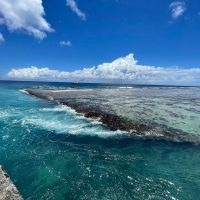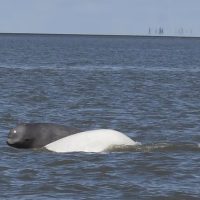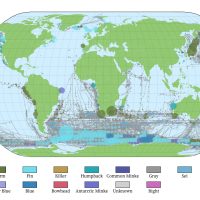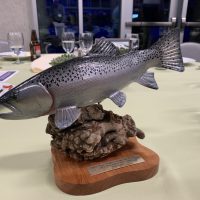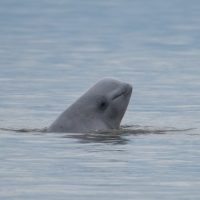Filter Results
Microplastics in the marine environment: research in Tetiaroa
Transitioning from a SAFS research scientist to a graduate student in Fall 2023, Kat Lasdin is familiar with the world of microplastics research. As a member of Jacqueline Padilla-Gamiño’s lab, one of the projects Kat has been involved in focuses on water, sand, and microplastics in Tetiaroa, an atoll in French Polynesia. Tetiaroa is also the site of a breadth of other UW-led work, including seabirds and shark research.
Read moreArial Brewer speaks with OPB about the impact of ship noise on beluga whales
SAFS PhD student, Arial Brewer, joins the Oregon Public Broadcasting ‘Think Out Loud’ series to share her research into the impact of ship noise on Alaska’s Cook Inlet beluga whales.
Read moreVital communications among the critically endangered Cook Inlet belugas may be masked by ship noise
New research led by SAFS doctoral student, Arial Brewer, documents the vocal repertoire of Cook Inlet beluga whales for the first time.
Read moreDiving deep into how fish impact carbon cycling in the ocean
Recently featured in Hakai Magazine’s article “All The Fish We Cannot See”, SAFS PhD student Helena McMonagle is conducting a deep dive into a hidden cache of fish that might play an unexpected role in how the ocean sequesters carbon. We caught up with Helena to find out more about it.
Since starting this research in 2019, I’ve been using data collected at sea and in the lab, along with bioenergetic models, to estimate how much carbon these mesopelagic fish, such as lanternfish, transport from surface waters into the twilight zone.
Supporting Tribal-led salmon monitoring using computer vision
UW researchers are developing a drone-based salmon survey method that the Sauk-Suiattle can use to manage resources.
Read moreWhaleVis turns more than a century of whaling data into an interactive map
A team at UW, including Trevor Branch from SAFS and Zoe Rand from QERM, have created an online interactive map called WhaleVis, which lets whale researchers visualize the IWC’s data on global whale catches and whaling routes. From this, researchers can estimate the animals’ spatial distribution and the effort whalers put into hunts.
Read moreThe scientists watching their life’s work disappear: Kristin Laidre featured in the NY Times
The Arctic is warming much faster than the rest of the planet. I study animals that are inextricably tied to the sea ice, which is disappearing. Narwhals spend most of their time in deep water, in and under dense ice. They need cold water. The other species I study is polar bears. Everything about being a polar bear is tied to the ice.
Read moreLooking to the past to inform the future
Historical ecology and data-limited fisheries stock assessment methods shed light on threatened Puget Sound Yelloweye Rockfish
By applying elements of historical ecology, fisheries science, and conservation biology in a highly collaborative research effort, researchers from the University of Washington School of Aquatic and Fishery Sciences (SAFS), NOAA Fisheries, and the Washington Department of Fish and Wildlife (WDFW) are delivering new insights into the status of Yelloweye Rockfish.
Tom Quinn receives Jack Williams Award for Applied Conservation Science
As part of the Trout Unlimited annual awards, SAFS Professor Tom Quinn has received the Jack Williams Award for Applied Conservation Science. Read about why Tom was selected for this award in the write-up below, reposted from Trout Unlimited.
Recently retired from full-time teaching and research at the University of Washington, Professor Tom Quinn deserves massive thanks for the huge body of research and writing on Pacific Rim fisheries and especially on salmon and trout of the Pacific Northwest and Alaska.
Read moreWhy are some protected species failing to recover?
New study uses integrated population models to predict extinction risk for Cook Inlet beluga whales and lend insight into factors limiting the recovery of protected populations.
Sparse monitoring data and persistent knowledge gaps can hamper conservation efforts aimed at recovering depleted wildlife populations. In a new study, researchers from the UW School of Aquatic and Fishery Sciences (SAFS) set out to tackle this issue for federally endangered Cook Inlet beluga whales by developing an integrated population model that capitalizes on all available information to understand factors that may be affecting survival, reproduction, and population viability.
